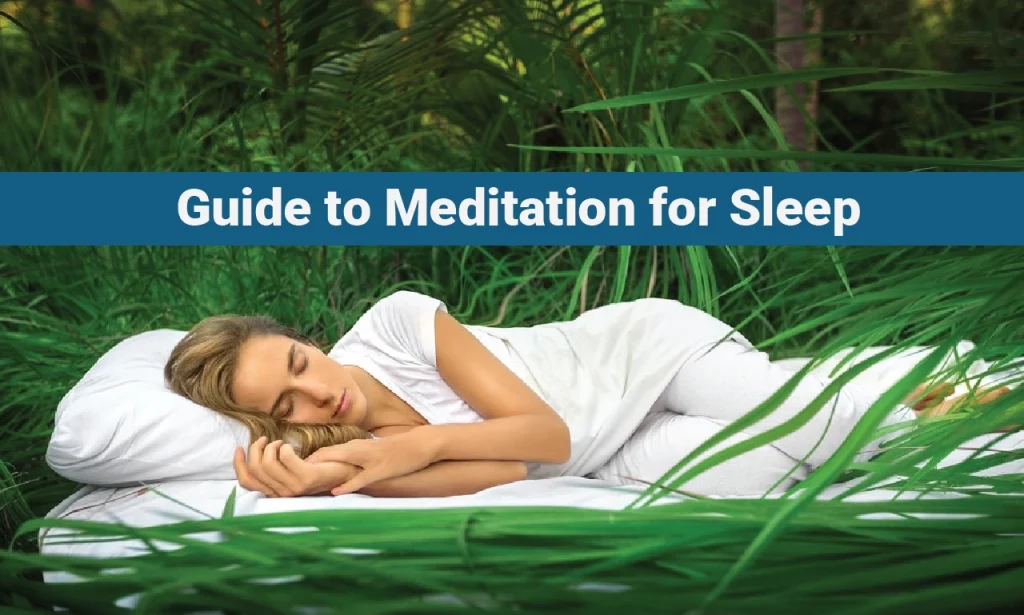Harness meditation and mindfulness for better rest. Improve sleep quality with mindful practices.
Are you struggling to get a good night’s sleep? Many people find it difficult to relax and unwind after a long day, leading to restless nights and groggy mornings. However, by incorporating meditation and mindfulness into your bedtime routine, you can experience a significant improvement in the quality of your rest.
<<Easiest & Proven Way to Make $100 Daily with 0 COST – Watch THIS FREE Training to START >>

Mindful sleep involves using techniques such as deep breathing, body scans, and focused awareness to calm the mind and promote relaxation. This approach can help reduce stress and anxiety, allowing you to drift off more easily and enjoy a deeper, more restorative sleep. We’ll explore the benefits of mindful sleep and how you can harness the power of meditation and mindfulness to achieve better rest.
Introduction To Mindful Sleep
Getting a good night’s sleep is essential for our overall well-being and productivity. However, many of us struggle with falling asleep or staying asleep throughout the night. This is where the concept of mindful sleep comes in. Mindful sleep combines the practices of meditation and mindfulness to help calm the mind and promote better rest. By incorporating these techniques into our bedtime routine, we can create an environment conducive to deep relaxation and rejuvenation.
The Concept Of Mindful Sleep
Mindful sleep involves consciously preparing our mind and body for restful sleep. It starts with setting a calming atmosphere in our sleep environment, free from distractions and electronic devices. By eliminating external stimuli, we create a peaceful space that encourages relaxation and tranquility.
Next, we focus on our breathing and engage in mindfulness meditation. This involves paying attention to our breath as we inhale and exhale, bringing our awareness to the present moment. By doing so, we let go of any racing thoughts or worries, allowing our mind to settle and prepare for sleep.
Additionally, practicing gratitude and positive affirmations before sleep can further enhance our mindful sleep experience. Reflecting on the positive aspects of our day and expressing gratitude helps shift our focus away from stress and promotes a more peaceful state of mind. Similarly, repeating positive affirmations can reinforce positive beliefs and create a sense of calm and confidence before sleep.
Benefits Of A Mindful Approach To Rest
Adopting a mindful approach to rest can have numerous benefits for our overall well-being. Here are some key advantages:
- Promotes relaxation: Mindfulness and meditation techniques help calm the mind and relax the body, making it easier to fall asleep and stay asleep throughout the night.
- Reduces stress and anxiety: By focusing on the present moment and letting go of worries, mindful sleep can significantly reduce stress and anxiety levels, leading to a more peaceful state of mind.
- Improves sleep quality: Mindful sleep techniques can enhance the quality of our sleep, allowing us to wake up feeling refreshed and rejuvenated.
- Enhances overall well-being: Getting sufficient, restful sleep is crucial for our physical and mental well-being. By incorporating mindfulness into our sleep routine, we can promote a healthier lifestyle and improve our overall quality of life.
Now that we have explored the concept of mindful sleep and its benefits, let’s dive deeper into specific techniques and practices that can help us harness the power of meditation and mindfulness for better rest.

Credit: www.linkedin.com
The Science Behind Mindful Sleep
Discover the science behind mindful sleep, where meditation and mindfulness are harnessed to improve rest. By incorporating these practices into your bedtime routine, you can achieve a deeper and more rejuvenating sleep experience. Embracing mindfulness can lead to enhanced relaxation and a more peaceful state of mind, promoting better overall sleep quality.
<<Easiest & Proven Way to Make $100 Daily with 0 COST – Watch THIS FREE Training to START >>
Brain Activity During Sleep
During sleep, our brains undergo a series of complex processes that are crucial for our overall well-being. One of these processes is the synchronization of brainwaves, which can be measured using an electroencephalogram (EEG). These brainwaves are categorized into different stages of sleep, including rapid eye movement (REM) sleep and non-rapid eye movement (NREM) sleep.
How Mindfulness Affects Sleep Quality
Mindfulness practices, such as meditation, have been shown to have a positive impact on sleep quality. Research has indicated that engaging in mindfulness techniques before bed can help calm the mind, reduce stress, and promote relaxation. This, in turn, can lead to improved sleep duration and quality.
The science behind mindful sleep lies in the way it influences our brain activity during sleep and how it affects sleep quality. By practicing mindfulness, we can regulate our brainwaves and promote a state of relaxation that is conducive to a restful sleep.
During mindfulness meditation, the brain experiences changes in activity. Studies have shown that regular meditation can increase alpha and theta brainwave activity, which are associated with deep relaxation and a calm mental state. This shift in brainwave patterns can help counteract the effects of stress and anxiety, allowing for a more peaceful and rejuvenating sleep experience.
Additionally, mindfulness practices have been found to activate the parasympathetic nervous system, also known as the “rest and digest” response. This activation helps to lower heart rate, blood pressure, and cortisol levels, further promoting a state of relaxation that is conducive to falling asleep and staying asleep throughout the night.
In summary, the science behind mindful sleep lies in its ability to regulate brain activity during sleep and improve sleep quality. By practicing mindfulness techniques, such as meditation, we can create a conducive environment for a restful and rejuvenating sleep experience.
Step One: Preparing The Mind
Cultivating A Relaxation Routine
Establish calming activities before bed like reading or gentle stretching.
Meditative Techniques For Sleep Preparation
- Practice deep breathing exercises to relax the mind and body.
- Engage in progressive muscle relaxation to release tension.

Credit: shows.acast.com
Step Two: Creating A Sleep-inducing Environment
Mindful sleep involves creating a conducive environment to promote rest. Optimizing your bedroom for sleep and managing light and sound play crucial roles in achieving this. By focusing on these aspects, you can enhance the quality of your sleep and overall well-being.
Optimizing Your Bedroom For Sleep
When it comes to creating a sleep-inducing environment, optimizing your bedroom is essential. This includes factors such as comfortable bedding, minimal clutter, and a soothing color scheme. By making these adjustments, you can promote a sense of calm and relaxation, setting the stage for restful sleep.
The Role Of Light And Sound
Managing light and sound in your sleep environment is vital for promoting mindfulness and better rest. Using blackout curtains to block out external light and incorporating white noise machines can help create a serene atmosphere conducive to sleep. Additionally, minimizing electronic devices and their disruptive sounds can further contribute to a tranquil sleep environment.
Step Three: Cultivating Sleep Hygiene
Cultivate optimal sleep conditions through mindful practices like meditation and mindfulness to enhance rest quality. Embrace sleep hygiene techniques to create a peaceful and calming bedtime routine for improved sleep patterns and overall well-being.
Regular Sleep Schedules
Diet And Exercise For Better Sleep
Step Three: Cultivating Sleep Hygiene is crucial for improving rest quality. Establishing regular sleep schedules can help regulate your body’s internal clock.
Ensuring you go to bed and wake up at the same time every day can optimize your sleep patterns.
- Avoiding caffeine and heavy meals close to bedtime can enhance sleep quality.
- Exercising regularly but not too close to bedtime can promote better sleep.
Maintaining a healthy diet and staying physically active can positively impact your sleep hygiene.
Step Four: Mindful Practices To Enhance Sleep
Mindful practices can significantly improve the quality of your sleep. By incorporating meditation and mindfulness into your bedtime routine, you can promote relaxation and reduce stress, paving the way for a restful night’s sleep.
Breathing Exercises For Relaxation
Breathing exercises can calm the mind and prepare the body for sleep. Practice deep breathing by inhaling for a count of four, holding for seven, and exhaling for eight. This technique activates the body’s relaxation response, promoting a sense of calm.
Body Scan And Progressive Muscle Relaxation
Body scanning involves focusing on each part of the body, releasing tension and promoting relaxation. Progressive muscle relaxation entails tensing and then releasing muscle groups, helping to alleviate physical and mental stress.
<<Easiest & Proven Way to Make $100 Daily with 0 COST – Watch THIS FREE Training to START >>
Step Five: Morning Mindfulness
Experience better rest by incorporating morning mindfulness into your routine. Through harnessing meditation and mindfulness techniques, you can cultivate a peaceful mindset that sets the tone for a restful sleep. Embrace the power of mindfulness to enhance your sleep and overall well-being.
Waking Up With Intention
Starting your day with intention can significantly impact your overall well-being. Instead of mindlessly going through the motions of your morning routine, take a few moments to set an intention for the day. This can be as simple as saying a positive affirmation or visualizing a successful day ahead. By starting your day with a clear intention, you’ll be more focused, calm, and prepared to tackle any challenges that come your way.
Setting The Tone For The Day
How you start your day sets the tone for the rest of it. Incorporating mindfulness practices into your morning routine can help you start the day on a positive note. Take a few moments to connect with your breath, stretch your body, or practice gratitude. By prioritizing mindfulness in the morning, you’ll be better equipped to handle stress throughout the day and maintain a sense of calm.
Here are some tips to help you incorporate morning mindfulness into your routine:
- Wake up a few minutes earlier to allow yourself time for mindfulness practices
- Try a guided meditation or yoga practice
- Practice gratitude by reflecting on something you’re thankful for each morning
- Set an intention for the day ahead
By starting your day with mindfulness and intention, you’ll be able to harness the power of a good night’s sleep and carry that sense of calm and focus with you throughout the day.
Common Challenges In Achieving Mindful Sleep
Achieving mindful sleep can be challenging due to various factors. Distractions, racing thoughts, and difficulty in letting go of the day’s stress can hinder the ability to fully relax. However, by harnessing the power of meditation and mindfulness, individuals can cultivate a state of calmness and tranquility, promoting better rest and rejuvenation.
Common Challenges in Achieving Mindful Sleep:
Mindful sleep is an effective way to improve the quality of sleep, but it can be challenging for many people to achieve. Here are some common challenges that people face when trying to achieve mindful sleep.
Dealing with Sleep Interruptions:
One of the biggest challenges in achieving mindful sleep is dealing with sleep interruptions. Sleep interruptions can be caused by many factors, including noise, light, discomfort, and anxiety. To deal with sleep interruptions, you can try the following:
– Use earplugs or white noise machines to block out noise.
– Use blackout curtains or eye masks to block out light.
– Adjust the temperature and humidity levels in your room to achieve maximum comfort.
Managing Stress and Anxiety at Bedtime:
Another common challenge in achieving mindful sleep is managing stress and anxiety at bedtime. Stress and anxiety can make it difficult to fall asleep and stay asleep. To manage stress and anxiety at bedtime, you can try the following:
– Practice relaxation techniques such as deep breathing or meditation.
– Write down your worries or concerns in a journal before going to bed.
– Avoid using electronic devices before bedtime, as they can increase stress and anxiety levels.
By dealing with sleep interruptions and managing stress and anxiety at bedtime, you can improve your chances of achieving mindful sleep. Remember, it takes time and practice to achieve mindful sleep, but the benefits are well worth the effort.
Tools And Apps To Aid Mindful Sleep
When it comes to achieving mindful sleep, technology can be a valuable ally. There are various tools and apps designed to aid in harnessing meditation and mindfulness for better rest. From guided meditation for sleep to technology that monitors sleep patterns, these resources can help individuals establish healthier sleep habits and improve overall well-being.
<<Easiest & Proven Way to Make $100 Daily with 0 COST – Watch THIS FREE Training to START >>
Guided Meditation For Sleep
Guided meditation for sleep can be an effective tool for calming the mind and promoting relaxation before bedtime. Many apps offer a range of guided meditation sessions specifically tailored to facilitate better sleep. These sessions often incorporate soothing music, gentle guidance, and mindfulness techniques to help individuals unwind and prepare for restful sleep.
Technology To Monitor Sleep Patterns
Monitoring sleep patterns is crucial for understanding sleep quality and identifying areas for improvement. Various technological tools, such as sleep tracking devices and mobile applications, can provide valuable insights into an individual’s sleep cycles, duration, and disturbances. By gaining a deeper understanding of their sleep patterns, individuals can make informed adjustments to their routines and environment to support better sleep.
Incorporating Mindful Sleep Into Your Lifestyle
Explore the art of incorporating mindful sleep into your lifestyle by harnessing meditation and mindfulness techniques. Enhance your rest quality through these practices, fostering a peaceful and rejuvenating sleep experience. Prioritize self-care and holistic well-being with mindful sleep practices.
Long-term Benefits Of Mindful Sleep
Mindful sleep improves focus and reduces stress.
Integrating Mindfulness Into Daily Routines
Start with deep breathing exercises each night.

Credit: www.linkedin.com
Frequently Asked Questions
Can Meditation Be As Restful As Sleep?
Yes, meditation can be as restful as sleep. Research shows that meditating for just 20 minutes can provide the same level of rest as 2-3 hours of sleep. During meditation, the brain enters into a state of deep relaxation, which helps to reduce stress, anxiety and promote restful sleep.
What Is Mindfulness Relaxation Technique?
Mindfulness relaxation technique involves focusing on the present moment without judgment. It helps reduce stress and anxiety by promoting awareness and calmness.
Can Mindfulness Meditation Replace Sleep?
Mindfulness meditation cannot replace sleep. While it can improve sleep quality, it’s not a substitute. Adequate sleep is essential for overall health and well-being.
Is It Better To Meditate In The Morning Or Night For Mindfulness?
Meditating in the morning is generally better for mindfulness as it can set a positive tone for the day and improve focus. However, meditating at night can also have benefits such as promoting relaxation and better sleep. Ultimately, the best time to meditate is when you can consistently make it a part of your routine.
How Does Mindfulness Help Improve Sleep Quality?
Mindfulness reduces stress, anxiety, and promotes relaxation, leading to better sleep quality.
What Meditation Techniques Are Beneficial For Better Sleep?
Practicing deep breathing, body scan, and guided imagery can promote relaxation for better sleep.
Can Mindfulness And Meditation Help With Insomnia?
Yes, mindfulness and meditation can calm the mind and body, aiding in managing insomnia.
Conclusion
Incorporating mindfulness and meditation practices into your sleep routine can lead to improved rest and overall well-being. By focusing on the present moment and calming the mind, you can reduce stress and anxiety, allowing for a deeper and more restorative sleep.
Additionally, practicing mindfulness can enhance your overall mindfulness throughout the day, leading to a more balanced and fulfilling life. So, take some time to prioritize your sleep and incorporate mindfulness techniques, and see the positive impact it can have on your life.
<<Easiest & Proven Way to Make $100 Daily with 0 COST – Watch THIS FREE Training to START >>
Thanks for reading my article on “Mindful Sleep: 5 Key Steps to Restful Nights & Brighter Days” I hope it will help you to take decision.













